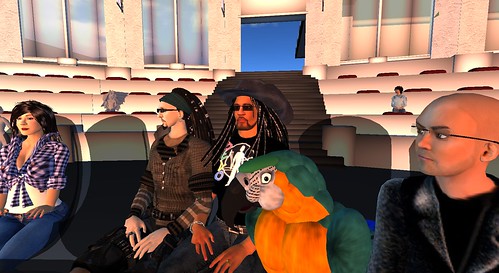
Location: Antique Desk, Scoring Writing Portfolios
It's time for us to assess a random sample of student work again.
I'm both pleased at the progress in using wikis, blogs, video, and even Second Life among our adjunct and full-time faculty teaching first-year writing.
At Richmond, the writing program has gradually integrated forms of technology, and what we in composition call "multiliteracies," over the past decade. Gone (thankfully) is the era when "comp" meant personal narratives (and grade inflation) or "lit lite," with short critical essays divorced from the schools of theory and research that have both enlivened and bedeviled literary studies in the past 20 years.
At the same time, other signature programs at our school and elsewhere in the humanities are mired in a pedagogy of Great Books or facile Multiculturalism, both of which I find out of touch with students' needs and interests in various ways. Both approaches presume that students know little and need to be exposed to a new form of thinking, either to civilize or sensitize them.
On May 11, the faculty here vote on a curriculum reform that has devoured dozens of hours of my rare free time. We've drafted a good proposal, one step to take us past the pedagogy of the 20th century. And we may fail.

Higher education, like the publishing industry, libraries, and even the "record store," faces the biggest change in literacy and the transmission of intellectual content since Gutenberg's press began to run. Faculty by and large are not prepared. To our students it's largely a non-issue.
This is the new generation gap.
It's not that students are careful users or even all that adept at new forms (they struggled this semester with video editing and backing up files on their iPods) . It's that they are so much further ahead, even in this clumsy way, than mainstream faculty who often have terrible problems posting to an online forum or learning a new version of MS Office.
But deeper still is the difference in epistemology: it's a difference of seeking knowledge from the hive-mind vs. great minds. Faculty, at my school and nationally, made strides in using Web 1.0 technology such as course-management software, online quizzes, and discussion lists. Where they have not adapted is with technology that is not so teacher-centered: wikis, embedded media, social networks, student-generated multimedia, and (of course) virtual worlds. To paraphrase from the a recent Second Life educational roundtable, too many faculty come to SL and expect to lecture...or build a lecture hall.
It's an ancient, and doomed, impulse. Consider this line from our current Core Course common syllabus, that "one of the best ways to learn to read, think, and express oneself well is to study the work of proven good readers, thinkers, and writers." Not a word about creating content, the basis of Web 2.0 technologies. Granted, studying "masterworks" is a fine notion, and it can advance student learning, but only to a point. The great minds of the past we've studied were largely Cartesian thinkers who relied upon an Aristotelian sense of order. Even Jefferson, with his protean mind, would have a hard time teaching college freshman today.
Now it's the link, not the line, as the mode of communication. And it's less "I think" than "others tweeted/blogged/tagged" that matters to the generation I'm teaching.
There's a saying I heard (source? I've lost it!) that Millennials want things to be free and they want them not to suck.
 For too many of them, what is on offer in higher education is both expensive and out-of-touch.
For too many of them, what is on offer in higher education is both expensive and out-of-touch.To appropriate some gamer-talk: Fail. Epic Fail.







